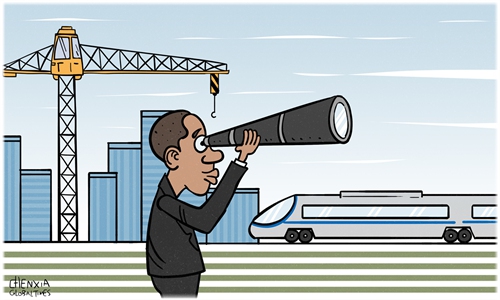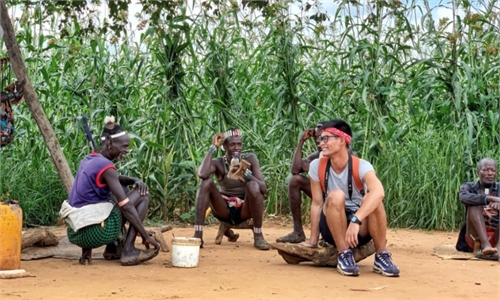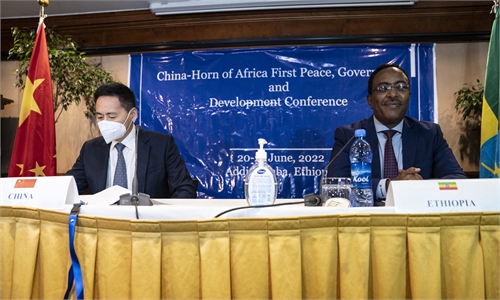IN-DEPTH / IN-DEPTH
Chinese in Africa promote understanding via vlogs, furthering China's positive influence to surpass US’ in latest survey
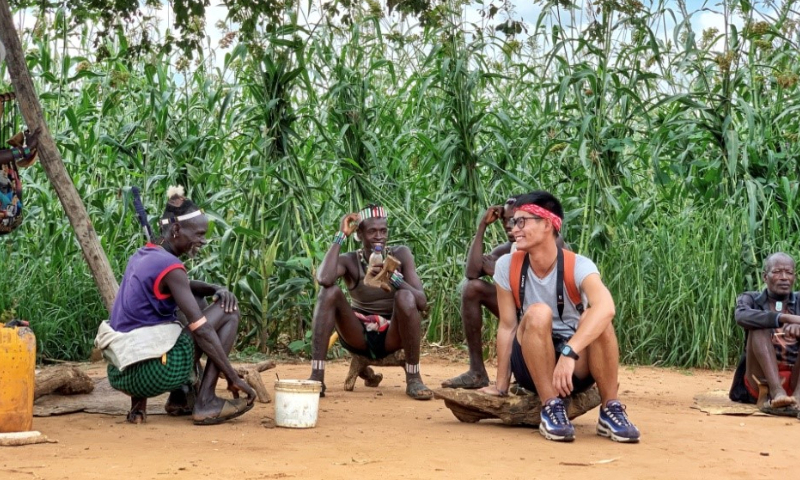
Johnny Zhong with the locals Photo: Courtesy of Zhong
People in China and Africa are unraveling their mystery to each other, as videos featuring stories made by Chinese YouTubers in Africa have been gaining popularity in streaming platforms in recent years, while more Africans, especially the young generation, are getting to know China through television and language learning.
Behind the increased understanding and affection between China and Africa is the result of China's cooperation and assistance in various fields in the continent for many years.
Recently, a survey revealed that for young Africans, China's positive influence on the continent has surpassed that of the US. Africa's youth view China as the most influential foreign country on their continent, with a positive contribution to infrastructural development and skills training, according to the report commissioned by South Africa's Ichikowitz Foundation this month.
The African Youth Survey 2022, done in 19 African countries, showed that 76 percent of the young people view China's influence as positive, while 77 percent see China as the strongest foreign power on the continent, according to Xinhua News Agency.
Ichikowitz Foundation Chairperson Ivor Ichikowitz said African youth have faith in the future of the relations between China and Africa, stressing that he believes that Africa and China can become "superpowers" in the future, according to Xinhua.
The tangible benefits of Africa-China cooperation have come to replace US-led diplomatic grandstanding and political meddling by American envoys to the continent, analysts said.
'I make videos to introduce true Africa to China'
Trying a foreign street food, dancing with talented village kids, fishing on the Atlantic, hanging out with African college students who speak astonishingly fluent Chinese and know Chinese actors well… This is what has been showcased in Johnny Zhong's channel about his life in Africa.
Zhong, a 27-year-old Chinese YouTuber based in Togo's capital Lomé, has been introducing his experiences in Africa in the past two years. He has traveled to 13 African countries and made more than 300 vlogs, garnering more than 560,000 followers on Bilibili and over 200,000 on YouTube.
A series in his channel shows interviews with Chinese people who work in Africa. For instance, Zhong talked to a Chinese teacher in a local high school, a young translator in a Chinese company and a grocery owner from a rural area in North China's Hebei Province who brought his whole family to Africa.
These videos show different possibilities of what can be achieved in another continent far from China. "Some of my audience came to Africa to work or invest after watching my videos," Zhong told the Global Times, adding that "they learned that Africa is a place of potential, vitality and progress."
Besides Zhong, Wang Fei, a Chinese businessman based in Guinea, is another known YouTuber introducing African stories.
Wang's channel features his daily life in a small city in Guinea. A boy that often appears in Wang's videos is 12-year-old Hou Sailei, who impressed many Chinese netizens for being smart.
Several years ago, Wang started to teach Hou Chinese language. "The Chinese cartoon 'Boonie Bears' and 'Pleasant Goat and Big Wolf' really helped a lot," Wang told the Global Times. "Hou grasped the language quickly," he said, remarking that now Hou is as good as a native speaker.
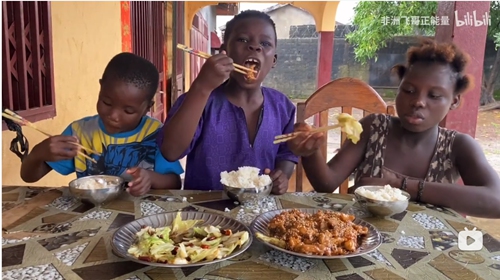
Screen shot of Wang Fei's vlog
Wang also taught Hou to cook Chinese dishes, such as steamed buns, pork stewed in soy sauce and steamed dumplings. Hou is very talented in cooking and this has become the most viewed content in Wang's channel.
Earlier this month, Hou started a Chinese course at the Confucius Institute of the Gamal Abdel Nasser University Of Conakry. Many Chinese netizens were touched by Hou's growth. "He's ready to fly like an eagle," one commented.
"People are seeing the development of Africa through my videos. When they see that the streets in my city are different from three years ago, then they understand Africa has not 'lagged behind' and is 'primitive' as some media have tried to hype," Wang told the Global Times.
Tangible benefits
China's role in Africa has evolved with the continent's needs, from helping Africa free itself from the claws of colonialism by supporting some of the continent's liberation movements, to the current struggle for economic development, analysts remarked.
"Africa has seen development and progress in the past years, which is inseparable from China's help and cooperation," Wang, who has worked in Africa for about 10 years, told the Global Times. "The majority of locals are very friendly to Chinese people," he said.
Wang mentioned that in Guinea, the hydropower stations and electricity system constructed with the aid of China have forever changed the African country's history. "Previously, there were power outages every one or two hours, but after the construction of the electricity project was finished, the problem has been solved."
The Kaleta Hydropower Station, renowned as "Three Gorges Project of Guinea," is one of the milestone projects under the Belt and Road Initiative. With its image printed on the largest banknote of Guinea, the Kaleta Hydropower Station is now a flagship overseas project of China's hydropower companies.
While constructing big cooperation projects in Africa, Chinese companies often help to promote local development and poverty reduction.
Since the beginning of the construction in 2013 of the Karuma Hydropower Project, one of Uganda's major projects, China's Sinohydro Engineering Bureau 8 Corp Ltd, builder and manager of the hydropower plant, has been helping to improve the living conditions of the local people.
For instance, the company helped build wells and bridges for nearby villagers, donated to poor students, built houses for the local garrison and provided free medical consultations to villagers.
Trade between China and Africa reached an all-time high in 2021 of $254 billion, from about $10 billion in 2000, according to Xinhua News Agency.
From 2005 to 2021, China organized 160 poverty reduction and foreign aid training programs. Some 2,700 people from 53 African countries participated in the training, accounting for almost 60 percent of the total number of trainees.
However, there is always a noise.
Media reported on Tuesday that a Chinese man was arrested in Zambia for making and selling racist videos about children from Malawi. The video caused great outrage on the Chinese internet when it was disclosed.
Zhong also published a video to show his position on June 18. "I was furious seeing this video which is rude," Zhong told the Global Times. "Most Chinese people and companies in Africa have been working hard to maintain the image of China here, respecting local people, making friends and helping each other," Zhong added.
Africa knowing China
A history of colonialism that was later replaced by Western hegemonic strong-arming tactics employed by the US on various African governments meant that African governments were at the mercy of Washington if they hoped to receive much-needed developmental aid, and this often came at the cost of sovereignty, Mark Allan, young Kenyan professional, told the Global Times. "But China offered a solution by treating African nations it chooses to partner with as equals, reducing reliance on foreign aid in the continent, and encouraging autonomy in governance," Allan stressed.
The COVID-19 global pandemic was a clear sign that Africa's safety and health are not a priority for the West, where countries chose to hoard much-needed vaccines. However, China stepped in donating vaccines and PPE to countries most in need, Allan noted.
The Chinese government has also pledged to provide satellite television to 10,000 African villages to help many in the continent, especially those in rural areas, to broaden their horizons, narrow the digital divide and boost local employment.
StarTimes TV, a Chinese-owned subscription television service provider, aired education programs among others through satellite television. Some locals said that virtual education can continue with the help of TV programs as a number of schools have been closed due to COVID-19 pandemic during that time.
The TV satellites provide choices to the people of West Africa to spend their leisure time with various shows, among which Chinese dramas are standing out. Many locals mentioned that the TV dramas have played an essential part in the cultural exchange between the two sides, Xinhua News Agency reported.
Whereas before there was an emphasis on learning western languages like French or German, now it is not uncommon for young Africans to take Chinese classes and learn more about the country. Chinese shows have become more popular and the largest digital TV platform in Africa is also Chinese, according to Allan.
China has become an increasingly popular education destination for African students wishing to pursue higher education abroad while Europe and the US were preferred before. Scholarships offered by the Chinese government to African students have leveled the playing field allowing international education to be far more accessible to Africans from all walks of life, provided that they have the required academic performance. In the past, such opportunities were reserved for the wealthy, Allan suggested.
African youth also appreciate Chinese-aid infrastructure projects which mean that avenues of economic growth are now far more open, said Allan.
Africa was beholden to international aid from countries like the US that often came with unfavorable conditions. The scope of its implementation was limited thus reducing the benefits received by the regular person. What China has offered African nations is a seat at the table between equals, where funds received from China through its various initiatives in the continent come with almost immediate improvements to the quality of life, according to Allan.
The overhaul of Kenya's infrastructure in the past decade is a good example of the tangible benefits that have helped dispel notions of the alleged debt-trap nightmare widely advertised by countries like the US, he suggested.


